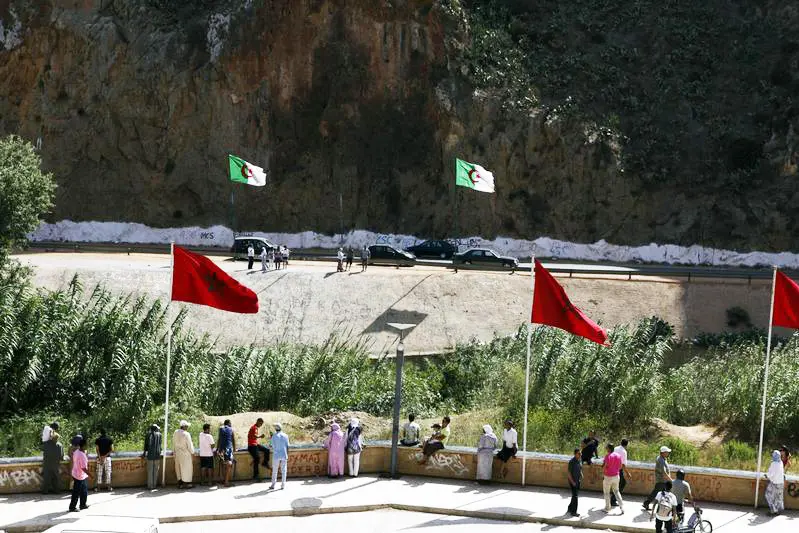PHOTO
The annual Throne Day speech in Morocco is always an important barometer of Moroccan policy, both domestic and international. Moroccans are accustomed to its content, such as how the country is dealing with societal changes, developmental challenges, building partnerships overseas and, of course, the customary indisputable confirmation of Western Sahara’s importance to its territorial integrity.
This year, many were left surprised, however, as half of King Mohammed’s speech was made up of a clear diplomatic overture calling for Morocco and Algeria to turn a page in their fraught relations. The message was clear: No two countries that are so incredibly alike should remain on either side of a closed border, “when their peoples are now connected through technology.”
The comments astounded many, but the generals in Algiers must have been the most surprised. The past year has seen tensions between the two countries escalate. Following almost a decade of hesitant thawing, Algeria’s fury at last year’s US recognition of Morocco’s right to Western Sahara — in return for Morocco’s establishment of diplomatic relations with Israel — and the secret May visit of the leader of the Polisario Front to Spain on forged Algerian diplomatic papers heralded the advent of a seemingly renewed period of strained ties.
Domestically, unrequited protests in Algeria have reflected increased public anger with “Le Pouvoir,” the military men who control the North African country. Last week, a shortage of clean running water caused by official mismanagement saw scenes of human waste being disposed of in heaps of plastic bags in temperatures nearing 40 degrees Celsius. Public anger at such shortcomings is increasingly coupled with social media shining a light on the developmental progress being made in the much poorer Morocco. A group of Algerian youths at the closed border crossing near Oujda last week filmed themselves making an unsuccessful attempt to cross into Morocco “so that we can work and live.”
Traditionally, the class of 1962 — veterans of Algeria’s independence from France — found having a foe in Morocco politically expedient, as it justified the continued militarization of the state. Increasingly, however, official attempts to blame Morocco for the failings of the country’s outmoded pseudo-Soviet outlook have worn thin with a public wishing to look ahead.
As the military has sought to ingrain a sense of separation between the two countries, an online “Moorish” movement has taken hold among young people from both sides, sharing their common history, heritage and origins. Young Algerians are increasingly skeptical in light of images and feel-good news stories of encouraging developments in Morocco, which have been airbrushed by official channels. In a clear bid to capture this sentiment, King Mohammed was forthright in calling for the two countries to seize the opportunity to celebrate their common history, cultural affinities and social interactions to rebuild relations “in a spirit of well-being, peace and freedom.”
In making clear that the closed Algeria-Morocco border was neither his doing nor that of current Algerian President Abdelmadjid Tebboune, King Mohammed offered an unmistakable olive branch to Algiers to remedy the building tensions. His speech also alluded to the important historical point that, prior to the French conquest of what became Algeria, large tracts of North Africa were united as Morocco, and it was only the advent of European colonialism that entrenched the divisions that the Ottoman governorships of Algiers and Tunis had already encouraged.
The persistence of such division, the king’s speech went on, is contrary to the aspirations for economic development of the people of both countries. He called for the free movement of goods, people and capital. In circumstances where it is cheaper for Algerian businesses to import some goods from China than from their neighbor and where Moroccan refineries have to serve West African producers in lieu of the energy behemoth next door, it is clear that the spirit of Maghreb unity is overdue for an overhaul.
The pandemic has exacerbated economic deficiencies in both countries, most importantly highlighting the impact of their dependencies on international patterns of trade. The effects of this have, for the first time in three decades, renewed interest in developing trade in what remains the least economically integrated region in the world. To this end, the tit-for-tat relations between the two countries require a new approach, and the king’s speech called for an end to the unhelpful rhetoric that has sullied the image of the two countries in the international arena.
During the war of independence, which remains the modern state of Algeria’s most pivotal formational moment, Algerian fighters launched attacks from Morocco and were armed and bandaged by their neighbor as they worked as “twin brothers,” as King Mohammed chose to refer to them. Last week’s announcement creates an opportune moment to capture this sentiment, reopen borders and resume political and economic relations to meet the aspirations of the two peoples, who see each other in the same brotherly light that their leaders once did.
- Zaid M. Belbagi is a political commentator, and an adviser to private clients between London and the Gulf Cooperation Council (GCC). Twitter: @Moulay_Zaid
Copyright: Arab News © 2021 All rights reserved. Provided by SyndiGate Media Inc. (Syndigate.info).





















